When planning an upscale event, it’s easy to focus on décor, catering, and entertainment—but don’t overlook waste management. Cleanliness is essential to maintaining an elegant atmosphere, and smart waste solutions help keep your event looking polished from start to finish. With discreet bin placement, matching receptacle styles, and coordinated staff support, you can ensure that trash doesn’t distract from the guest experience. Whether you’re hosting a wedding, corporate gala, or private celebration, having a thoughtful waste management plan helps keep your event both stylish and sustainable.
Key Takeaways
- A clean venue helps maintain a polished, elegant look throughout the event.
- Stylish, coordinated trash and recycling bins enhance event décor.
- Clear bin placement and signage help guests dispose of waste properly.
- Composting and recycling can be easily included at upscale events.
- On-site staff can manage trash discreetly to avoid interruptions.
- Partnering with rental companies that offer waste solutions saves time and improves results.
The Key Benefits of Streamlined Waste Management for Classy Events
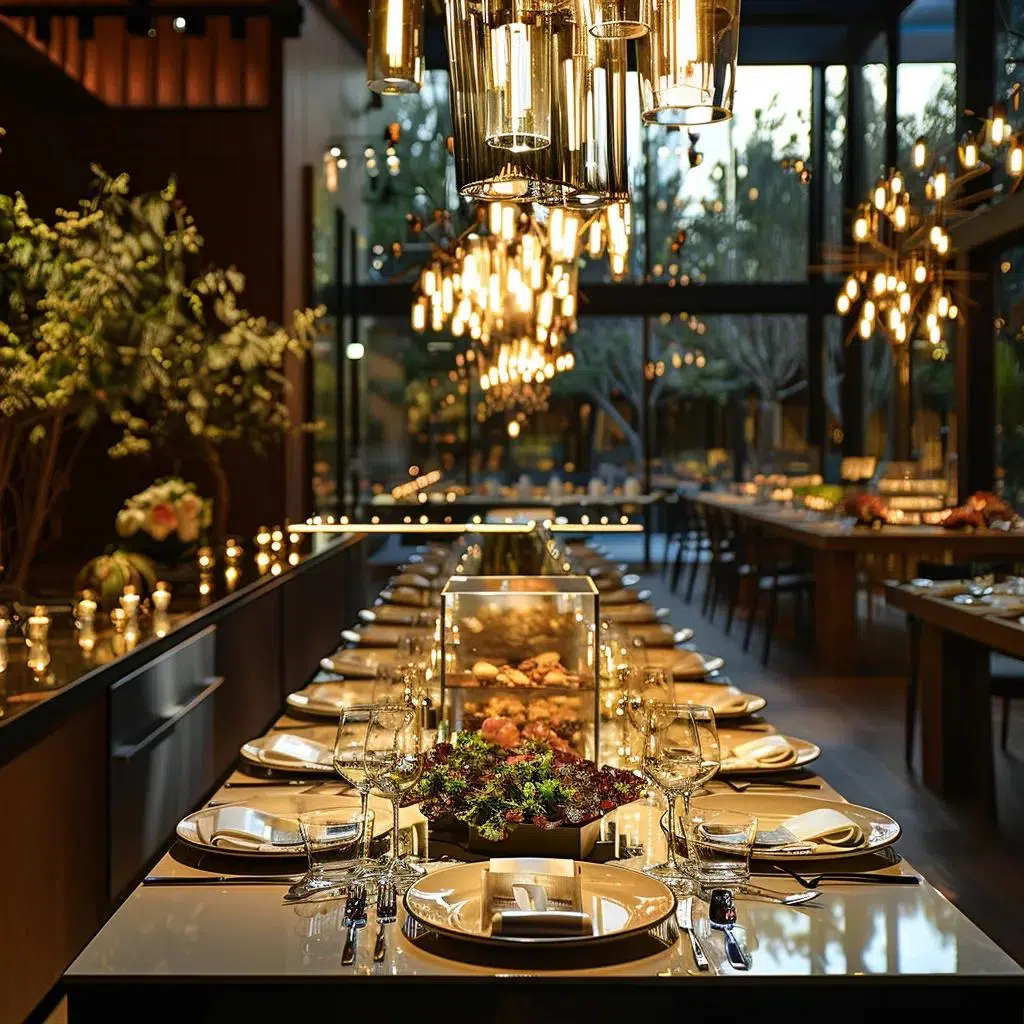
Smart waste management keeps venues clean, welcoming, and visually refined. Timely removal of trash and recyclables prevents clutter, controls odors, and keeps walkways clear. When managed well, waste never distracts from the event experience—it quietly supports it. Coordinated bin placement and elegant, matching receptacles help maintain the design flow, while systems for separating compost, recycling, and general waste ensure smooth operations. With the right strategy, event hosts can offer both sophistication and environmental responsibility.
How Does Waste Management Enhance Event Cleanliness and Aesthetics?
Well-managed waste systems protect the overall look and feel of the event. Clean floors, organized waste stations, and concealed disposal points help preserve table settings, floral displays, and high-traffic areas. Stylish receptacles that match the décor act as part of the design rather than an afterthought. The result is a space that feels polished and professionally maintained from start to finish.
The Role of Sustainability in High-End Event Waste Plans
Eco-conscious practices are becoming a standard part of elevated event design. Recycling stations, compostable materials, and waste-sorting systems contribute to a lower environmental footprint without compromising style. When planners choose biodegradable supplies or work with vendors who reduce single-use plastics, it sends a clear message about values and vision. Sustainability isn’t just practical—it also enhances the overall guest impression and brand image.
Professional Services That Deliver Discreet and Efficient Waste Handling
Experienced vendors offer more than just bins. They bring tailored waste management plans designed around your venue layout, guest count, and aesthetic preferences. Services may include custom bin placement, pre-scheduled pickups, and post-event cleanup audits. Uniformed staff handle disposal discreetly during key moments, ensuring that the event runs smoothly without interruptions. With expert support behind the scenes, waste stays out of sight and out of mind—exactly where it should be.
How Is Waste Stream Analysis Conducted for Classy Events?
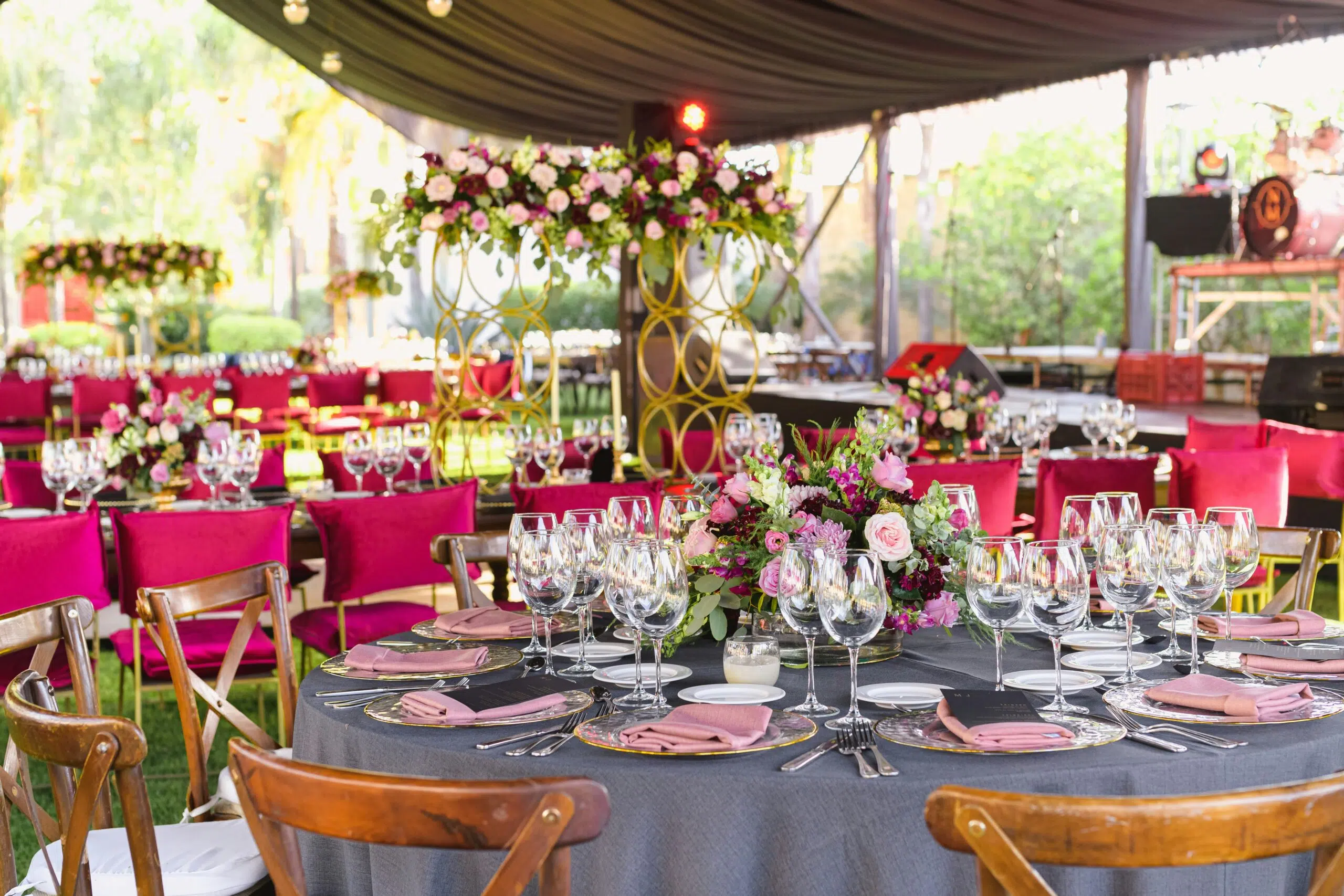
Waste stream analysis begins with a clear breakdown of what types of waste an event is likely to generate. Experts examine materials such as paper products, disposable cups, food containers, and organic leftovers to determine disposal needs. This insight guides decisions on bin sizing, labeling, and placement, helping planners set up efficient, visually unobtrusive waste systems. A well-executed analysis ensures that cleanup operations stay organized without interfering with the event’s flow or elegance.
What Types of Waste Are Common at Weddings and Corporate Galas?
Weddings and galas often generate a mix of paper programs, plastic drinkware, catering waste, glass bottles, and compostable food scraps. Understanding this mix is essential for setting up appropriate disposal stations. Clearly marked bins for recycling, compost, and trash reduce clutter and help keep the venue clean and well-organized throughout the event.
How Does a Waste Audit Improve Event Waste Reduction?
A waste audit reviews the types and quantities of waste produced, offering valuable insight into where improvements can be made. For example, it might reveal that too many recyclables are ending up in trash bins or that excess food waste could be composted or donated. With these findings, planners can fine-tune their approach—often cutting waste output by a third and improving sustainability without sacrificing convenience or style.
What Customized Waste Management Plans Are Recommended?
Effective plans start with event-specific details: guest count, layout, vendor logistics, and décor style. From there, planners can coordinate strategic bin placement, schedule timely waste collection, and choose receptacles that blend in with the surroundings. For larger events, including portable restrooms and staffing support ensures that waste is managed without disrupting the guest experience. When vendors and planners align early, waste solutions fit seamlessly into both the function and the look of the event.
What Are Elegant Waste Receptacles and How Do They Complement Classy Event Decor?
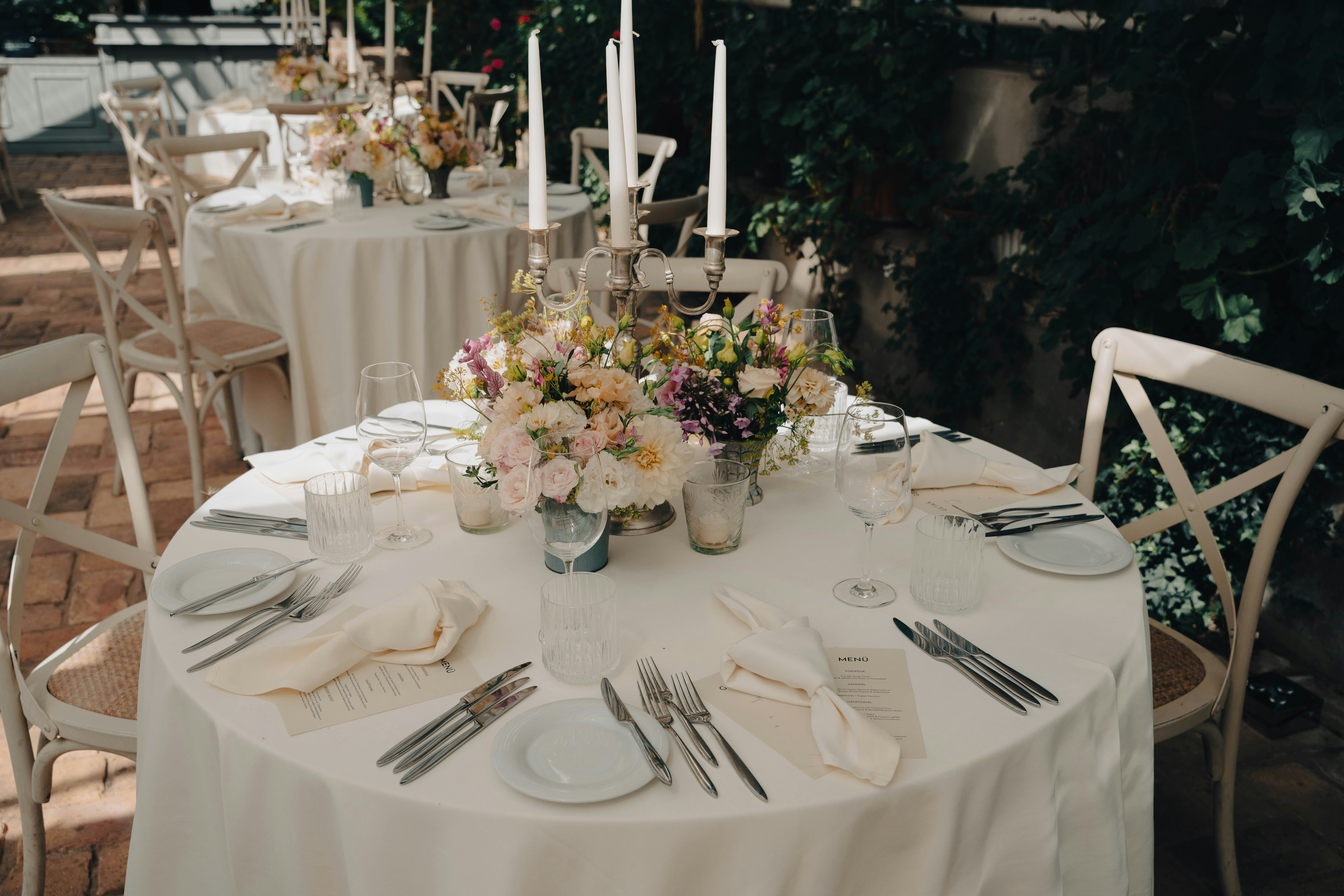
Elegant waste receptacles are designed to blend with luxurious decor using high-end finishes like brushed metal or polished wood. Rather than hidden away, these receptacles serve as stylish design elements that support an upscale event ambiance.
Which Stylish Recycling and Compost Bins Suit Luxury Events?
Luxury events benefit from recycling and compost bins featuring sleek lines, glass details, chrome finishes, and custom branding. These designs not only serve practical functions but also enhance the overall visual flow, ensuring that waste disposal complements the event style.
How Should Waste Receptacles Be Strategically Placed for Maximum Efficiency?
Bins should be placed near food service areas and along major pathways, yet subtly integrated within decorative installations. This strategic placement keeps them accessible without detracting from the event’s visual charm or causing visual clutter.
What Materials and Designs Ensure Both Functionality and Elegance?
Durable materials like stainless steel, tempered glass, and eco-friendly composites are ideal for maintaining hygiene and ease of cleaning. Modern features such as digital signage and contactless disposal add to functionality while matching coordinated color schemes to support a neat, elegant environment.
How Do Sustainable Recycling and Composting Programs Work at Classy Events?
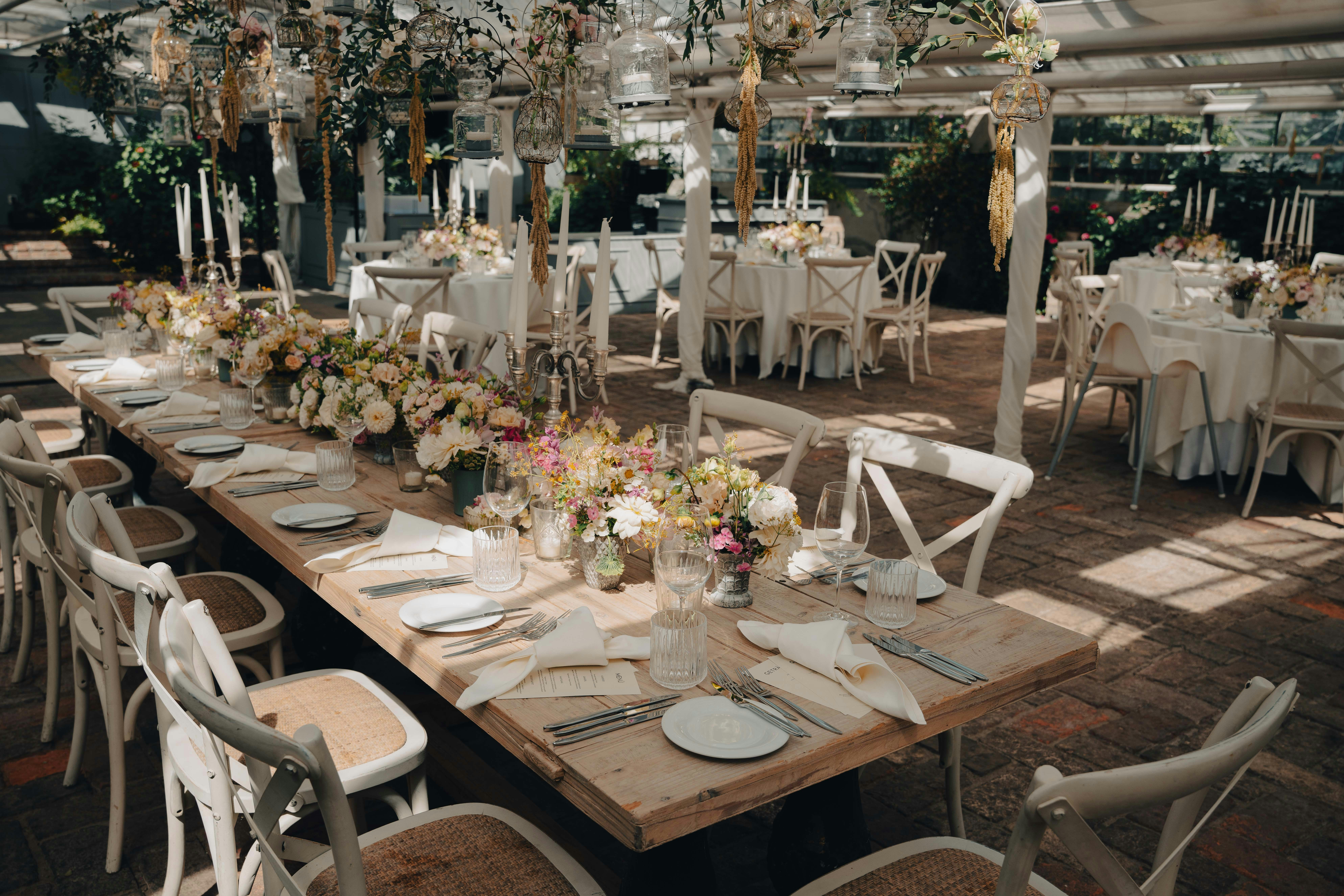
These programs segregate waste into clearly marked bins that facilitate immediate sorting during the event. On-site education helps guests dispose of materials correctly, ensuring maximum participation and effective waste diversion. Data collected improves future sorting practices and diversion rates.
What Are Effective Recycling Strategies for High-End Events?
Effective strategies include prominent labeling of recycling stations, dedicated bins for plastics, glass, and paper, and clear signage that educates guests. Staff positioned at key points help ensure correct usage, thus reducing contamination and reinforcing the event’s commitment to sustainability.
How Is Composting Integrated Into Event Waste Solutions?
Organic waste such as food scraps is collected in designated bins placed near food service areas. This material is later processed at local composting facilities, returning nutrients to the soil and reducing the volume of waste sent to landfill.
What Are Waste Diversion Techniques to Minimize Landfill Impact?
Techniques include pre-event bin labeling, on-site segregation, and partnerships with local recycling services. Practices like donating excess food and reusing decor items further minimize waste generation, while regular data-driven audits ensure continuous improvement in waste diversion.
What on-Site Waste Management Services Support Clean and Classy Events?
On-site services manage waste from collection and containment to removal and post-event analysis. Professional teams use discreet, portable systems to ensure the venue remains pristine throughout the event.
How Do Trained Staff Manage Waste Collection and Sorting Discreetly?
Uniformed staff equipped with modern disposal tools follow strict protocols to collect and sort waste efficiently during low-traffic periods, ensuring minimal guest disruption while maintaining operational effectiveness.
What Post-Event Waste Removal and Reporting Services Are Offered?
After the event, complete waste removal and detailed reporting—including waste volumes, recycling rates, and improvement recommendations—ensure transparency and help refine future waste management strategies.
How Are Customized Waste Solutions Developed for Unique Event Needs?
Initial consultations assess event size, layout, expected waste, and aesthetic requirements. Vendors then craft a strategy integrating technology and tailored design elements to support the event’s overall ambiance with a coherent waste management system.
How Can Event Planners and Venues Collaborate for Streamlined Waste Solutions?
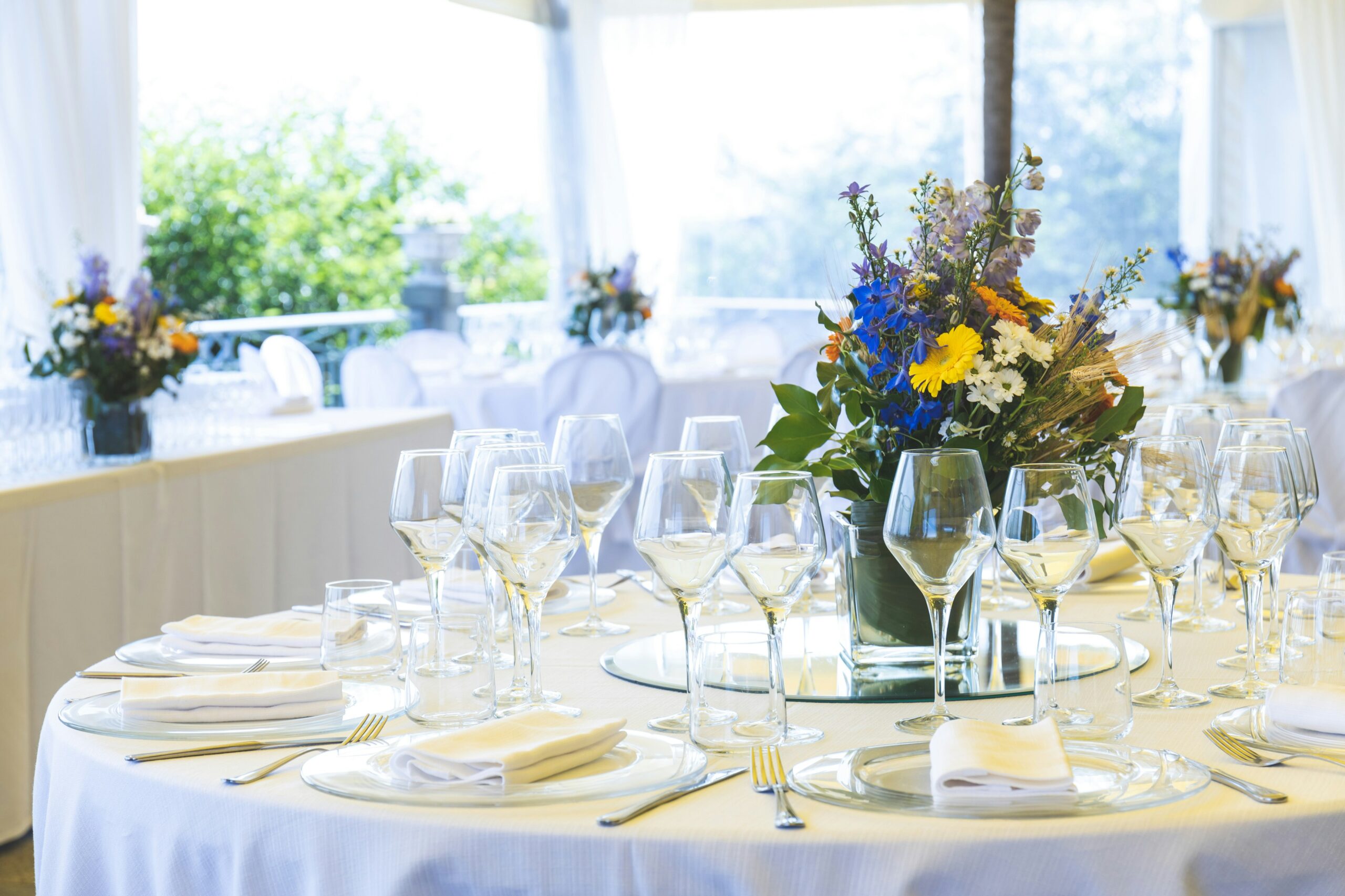
Strong collaboration between planners and venues lays the foundation for effective waste management. Early coordination allows both teams to align on logistics, bin placement, and service timing. Sharing audit data helps tailor solutions to the event’s needs, while joint staff briefings ensure everyone understands their role in keeping the space clean, organized, and visually appealing.
What Are Best Practices for Event Planners to Implement Waste Management?
Start early. Engaging vendors during the initial planning phase allows for customized waste strategies that fit the event layout and schedule. Incorporate audits to anticipate disposal needs, then design signage and waste stations that are both functional and guest-friendly. Train on-site staff to monitor waste areas throughout the event, ensuring quick response and minimal disruption.
How Do Venues Support Elegant and Sustainable Waste Systems?
Venues play a critical role in waste coordination. Designated waste zones, composting options, and built-in recycling infrastructure help streamline operations. Venues that offer support staff, recommend eco-conscious vendors, or provide matching waste bins make it easier to uphold both sustainability goals and the event’s aesthetic vision.
What Are Common Challenges and How Are They Overcome?
Unpredictable waste volumes, limited space, and guest misplacement of waste are common hurdles. These are addressed with scalable waste plans, flexible bin placement, and clear, attractive signage. Ongoing communication between staff and vendors—along with real-time adjustments during the event—keeps everything running smoothly. When everyone is prepared, even last-minute surprises are easy to manage.
Frequently Asked Questions
How does waste management improve the look of an event?
Proper waste systems prevent clutter, keep pathways clear, and ensure trash is collected without disrupting your décor or guest experience.
What are the best waste practices for weddings or galas?
Use matching bins that blend into your theme, clearly label them for recycling or composting, and place them near high-traffic areas like food stations.
Can rental companies provide trash bins and staff?
Yes, many event rental companies offer stylish waste bin options and can coordinate with cleanup crews for smooth, hands-off trash management.
How does composting work at private events?
Compost bins collect food scraps and organic waste near catering stations. These are later processed by composting facilities or local services.
Is it worth doing a waste audit for a one-day event?
Even for short events, a simple pre-event plan helps you avoid overflow issues and supports recycling goals, especially for large guest counts.
Conclusion
Thoughtful waste management plays a big role in creating seamless, stylish events. From elegant bin designs to quiet on-site cleanup, having the right solutions in place ensures that your event stays beautiful and stress-free. By working with vendors or rental companies that understand the importance of both aesthetics and sustainability, you can focus on what matters most—hosting a memorable, high-end experience your guests will love.






